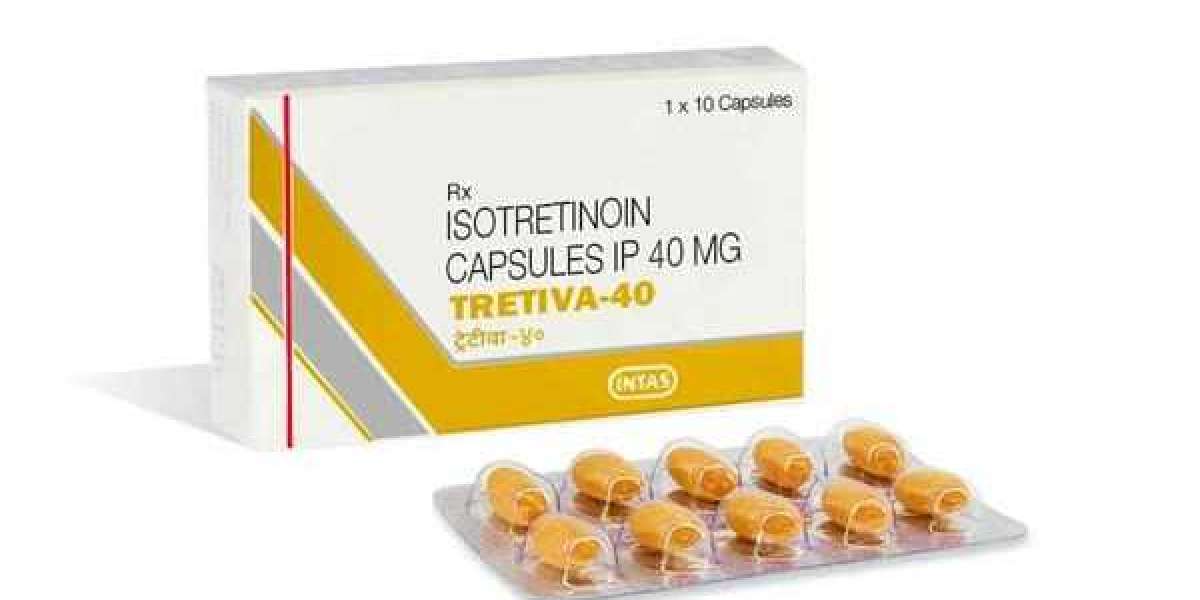Isotretinoin, commonly marketed under names like Accutane, Claravis, and others, is a potent medication primarily prescribed for the treatment of severe and persistent acne. While it can be highly effective in managing this skin condition, it is crucial to be well-informed about its potential side effects and associated risks before embarking on a course of treatment. In this comprehensive discussion, we'll delve into what Isotretinoin is, how it works, and the range of side effects it can produce.
Understanding Isotretinoin
Isotretinoin 40 mg is a synthetic form of vitamin A, and it belongs to a class of drugs called retinoids. Its mechanism of action primarily targets the sebaceous (oil-producing) glands in the skin. By reducing the size and activity of these glands, Isotretinoin helps decrease the production of oil, effectively treating severe forms of acne that are often unresponsive to other treatments.
The drug is typically prescribed when other conventional acne therapies, such as topical creams, oral antibiotics, or hormonal treatments, have failed to yield satisfactory results. Isotretinoin is known for its high success rate in treating severe nodular acne and preventing recurrent scarring, making it a preferred choice for dermatologists and patients in such cases.
The Range of Side Effects
While Isotretinoin's efficacy in managing severe acne is well-established, it is equally known for its potential side effects, which can range from mild and manageable to severe and, in some instances, life-altering. It's imperative to understand these side effects and their associated risks, as well as the measures to minimize or manage them.
Common and Mild Side Effects
Dry Skin: One of the most common side effects of Accutane 40 mg is dry skin. This can result in flakiness, redness, and itching. Moisturizing creams and lotions can help alleviate this discomfort.
Chapped Lips: Dry, chapped lips are a frequent side effect. Regular application of lip balm or petroleum jelly can provide relief.
Dry Mucous Membranes: Dryness can also extend to mucous membranes, leading to dry, irritated eyes, nose, and throat. Using artificial tears and saline nasal sprays can help alleviate these symptoms.
Increased Sensitivity to Sun: Isotretinoin can make your skin more sensitive to sunlight, increasing the risk of sunburn. Proper sun protection with sunscreen and protective clothing is essential.
Initial Acne Flare-Up
An intriguing aspect of Isotretinoin treatment is the potential for an initial worsening of acne symptoms before improvement occurs. This phenomenon is known as an "acne flare-up." It can be distressing for patients, but it's typically a sign that the medication is working. The flare-up usually subsides after a few weeks, leading to a gradual reduction in acne lesions.
Less Common, But Serious Side Effects
Mood Changes: Some individuals may experience mood changes while taking Isotretinoin. This can include symptoms of depression, anxiety, and irritability. While a direct causal link between Isotretinoin and mood changes remains debated, it's crucial to promptly report any emotional or psychological symptoms to your healthcare provider.
Gastrointestinal Issues: Isotretinoin has been associated with inflammatory bowel disease (IBD) in some cases, though the exact relationship is complex and not fully understood. If you experience symptoms such as severe abdominal pain, diarrhea, or rectal bleeding, it is vital to inform your healthcare provider immediately.
Elevated Cholesterol and Liver Enzymes: Isotretinoin can lead to an increase in blood cholesterol levels and alterations in liver function tests. Regular monitoring of these parameters during treatment is essential to manage these potential risks.
Teratogenicity - A Special Warning
Isotretinoin carries a black-box warning regarding its teratogenic effects, meaning it has the potential to cause serious birth defects if taken during pregnancy. The risk is so significant that the drug should not be used by women who are pregnant or planning to become pregnant during treatment and for a specific period afterward. Preventing pregnancy while taking Isotretinoin is a critical consideration, and healthcare providers often require women of childbearing age to use two forms of contraception and regularly undergo pregnancy tests.
The teratogenic potential of Isotretinoin underscores the importance of strict adherence to pregnancy prevention measures during treatment. Women who become pregnant while on Isotretinoin should immediately discontinue the medication and consult their healthcare provider to discuss the potential risks and options.
Risk Management and Monitoring
Given the array of potential side effects, risk management and close monitoring are essential components of Isotretinoin treatment.
Before initiating treatment, your healthcare provider will conduct a thorough evaluation, including a review of your medical history and a discussion of potential risks. You'll also receive detailed information about the drug, its potential side effects, and the importance of pregnancy prevention.
Throughout treatment, regular follow-up appointments are typically scheduled. These visits serve multiple purposes:
Assessment of Progress: Your healthcare provider will evaluate your response to Isotretinoin, including improvements in acne and any side effects experienced.
Laboratory Monitoring: Blood tests may be performed to monitor lipid (cholesterol) levels, liver function, and pregnancy status.
Discussion of Side Effects: You'll have the opportunity to discuss any side effects or concerns you may be experiencing. Healthcare providers can provide guidance and adjustments to the treatment plan as needed.
Pregnancy Testing: If you are of childbearing age and female, regular pregnancy testing is an integral part of monitoring. Ensuring that you are not pregnant is paramount to preventing birth defects.
In summary, the management of Isotretinoin's potential side effects involves a combination of proactive steps. Patients should adhere to their treatment plan, report any side effects or mood changes promptly, and engage in open communication with their healthcare provider. Additionally, strict compliance with pregnancy prevention measures is essential for those of childbearing potential.
Conclusion
Isotretinoin is a potent medication renowned for its effectiveness in treating severe acne. However, its use comes with a spectrum of potential side effects, ranging from mild and manageable to severe and, in some cases, life-altering. Patients considering Isotretinoin should engage in thorough discussions with their healthcare providers to weigh the potential benefits against the risks and understand the importance of risk management and monitoring throughout the treatment process. Adherence to safety protocols, open communication, and regular follow-up appointments are key components of a successful Isotretinoin treatment plan.


